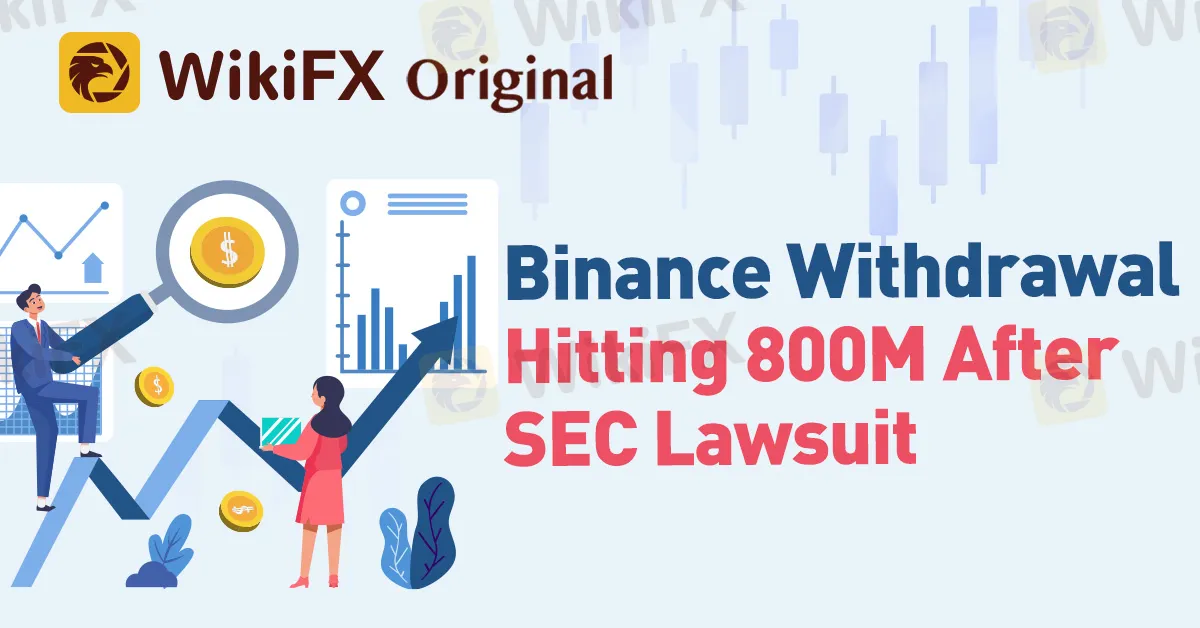简体中文
繁體中文
English
Pусский
日本語
ภาษาไทย
Tiếng Việt
Bahasa Indonesia
Español
हिन्दी
Filippiiniläinen
Français
Deutsch
Português
Türkçe
한국어
العربية
Binance Withdrawal Hitting 800M After SEC Lawsuit
Abstract:The surge in withdrawals faced by Binance following the SEC lawsuit has hit nearly $800 million within 24 hours. This could bring detrimental impact on any cryptocurrency exchange, including financial strain, market volatility, reputational damage, and operational challenges.

Cryptocurrency exchange Binance and its U.S. affiliate faced a significant setback as they encountered withdrawals exceeding $790 million within a span of 24 hours following the Securities and Exchange Commission (SEC) filing a lawsuit against them.
According to data reported by Reuters from Nansen, Binance suffered a substantial withdrawal amounting to $778.6 million during this critical 24-hour period, while Binance.US experienced losses of $13 million. The native BNB token of Binance witnessed a decline of over 12% since the announcement of the lawsuit, while its BUSD stablecoin suffered an additional 1% loss in market capitalization. This decline follows a previous SEC action that had caused the market value of the dollar-pegged token to plummet from $18 billion to $5 billion.
Coinbase (COIN) also became a target of a separate legal proceeding initiated by the SEC on Tuesday morning, resulting in losses of $57.7 million for the rival exchange. Consequently, the company's shares experienced a 16% decline on Monday.
The SEC's lawsuit, filed on Monday, accused Binance, its U.S. affiliate, and founder Changpeng Zhao of violating U.S. securities laws. The comprehensive lawsuit included allegations of misleading investors, engaging in wash trading, and earning a staggering $11.6 billion in trading fees from unregistered operations.
Binance further faced accusations of conducting an unregistered sale offering of its BNB and BUSD tokens, as well as an unregistered staking service. Similar charges were brought against Coinbase, with the firm being accused of “depriving investors” of sufficient protections.
These lawsuits serve as another blow to the cryptocurrency industry and represent the latest in a series of crackdowns by the SEC against exchanges.

In response to regulatory uncertainty, the Bittrex exchange recently announced the closure of its U.S. business and subsequently filed for Chapter 11 protection. Similarly, the Kraken exchange was compelled to cease its staking service and pay $30 million to the SEC as part of a separate settlement.
This sudden outflow of funds can have severe implications for any company, especially those operating in the fast-paced and ever-evolving cryptocurrency industry.
The financial strain resulting from such a significant withdrawal surge can be overwhelming. In Binance's case, the company experienced a withdrawal of $778.6 million, causing immediate liquidity challenges. This sudden loss of funds disrupts the exchange's ability to maintain sufficient reserves, affecting its operational capacity and potentially jeopardizing its ability to handle user transactions promptly.
Furthermore, the withdrawal surge directly impacted the market performance of Binance's native token, BNB. With the announcement of the lawsuit, the BNB token witnessed a decline of over 12%. This decline not only affects the token's market value but also erodes investor confidence in the platform, as users become wary of potential risks and uncertainties associated with the ongoing legal proceedings.
The consequences of a surge in withdrawals extend beyond financial implications. Cryptocurrency exchanges, like Binance, heavily rely on establishing and maintaining trust with their user base. A sudden wave of withdrawals following legal action can undermine that trust, as users question the stability and security of their funds. Negative publicity and market uncertainty can tarnish a company's reputation, making it difficult to recover the trust and confidence of users and investors.
Managing a sudden influx of withdrawal requests poses significant operational challenges for any exchange. The sheer volume of transactions necessitates prompt and efficient processing to ensure customer satisfaction. Failure to handle withdrawals swiftly and effectively may result in prolonged waiting times, frustrated users, and increased customer support demands. This, in turn, can further strain the resources and capabilities of the exchange, exacerbating the overall impact of the withdrawal surge.

Disclaimer:
The views in this article only represent the author's personal views, and do not constitute investment advice on this platform. This platform does not guarantee the accuracy, completeness and timeliness of the information in the article, and will not be liable for any loss caused by the use of or reliance on the information in the article.
Read more

Gigamax Scam: Tracking Key Suspects in RM7 Million Crypto Fraud
Malaysian authorities are actively pursuing seven individuals linked to the Gigamax investment scam, which has defrauded investors of over RM7 million. The suspects include an Indonesian national, identified as Awaludin, who is believed to be the mastermind behind the scheme, and six Malaysians who served as promoters and speakers for the fraudulent operation.

Singaporean Arrested in Thailand for 22.4 Million Baht Crypto Scam
Thai authorities have apprehended a 32-year-old Singaporean man suspected of being part of a transnational syndicate involved in cryptocurrency scams. The group is accused of defrauding victims of more than 22.4 million baht (S$886,000) through a fraudulent trading platform.

Kraken and BitGo to Handle FTX Payouts Starting January 2025
Kraken and BitGo will oversee the first FTX payouts starting January 3, 2025. 98% of creditors receive at least 118% of their claims in cash.

FCA Seeks Input to Shape UK Crypto Market Regulations
UK FCA seeks public feedback on crypto rules to improve market transparency, protect consumers, and support growth. Comments are open until March 2025.
WikiFX Broker
Latest News
Volkswagen agrees deal to avoid Germany plant closures
Geopolitical Events: What They Are & Their Impact?
Top 10 Trading Indicators Every Forex Trader Should Know
TradingView Launches Liquidity Analysis Tool DEX Screener
MultiBank Group Wins Big at Traders Fair Hong Kong 2024
WikiEXPO Global Expert Interview: Simone Martin—— Exploring Financial Regulation Change
'Young investors make investment decisions impulsively to keep up with current trends' FCA Reveals
Why Do You Feel Scared During Trade Execution?
CySEC Settles Compliance Case with Fxview Operator Charlgate Ltd
Malaysian Influencer Detained in Taiwan Over Alleged Role in Fraud Scheme
Currency Calculator


